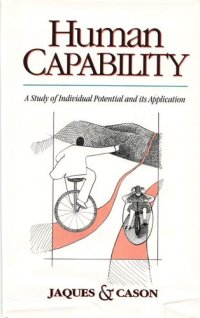
Ebook: Human Capability: A Study of Individual Potential and Its Application
Author: Elliott Jaques Kathryn Cason
- Tags: SST RO Requisite Organization Stratified Systems Theory Work Levels Cognitive Capability
- Year: 1994
- Publisher: Cason Hall & Co Pub
- Language: English
- pdf
This books reports research and field work over many years, that has demonstrated with high reliability and validity:
That individuals process information when heavily engrossed in work, in four and only four ways;
That these four ways recur in progressively higher orders of information complexity
That this hierarchy of methods of mental processing corresponds with levels of individual capability and gives an objective method of observing this capability.
The substantial social consequences are discussed.
The authors were faced with a seemingly difficult ethical dilemma in approaching the research reported and in deciding to publish the results of the research. The dilemma has to do with the nature of the possible impact upon society of providing it with a form of knowledge that would make it possible as a matter of ordinary everyday observation for everyone to evaluate everyone's current level of potential capability, including their own. To understand this dilemma, picture a situation in which employers knew the level of potential capability of each and every on of their employees; subordinates of their managers; parents of their children; teachers of their pupils---and young adult students of their teachers; friends of each other; spouses of each other; and on and on to everyone of everyone.
To illustrate further, imagine a nation which all citizens are able to sit back and evaluate the level of potential capability of each and every one of the candidates running for an election in political campaigns, simply by observing certain manifest features of their performance when engaged in spontaneous political debate as, for example, on television. And "evaluate" is used here in the sense of being able to articulate that evaluation in a form readily understood by others, so that the innate capability of their candidates could become a matter of everyday discussion and consideration.The authors' clear and explicit judgment, therefore, has been that to be able to develop an objective, openly available, socially shareable method of evaluating potential capability, and one that is both reliable and valid, is to be unequivocally on the side of the social good from the ethical point of view.
That individuals process information when heavily engrossed in work, in four and only four ways;
That these four ways recur in progressively higher orders of information complexity
That this hierarchy of methods of mental processing corresponds with levels of individual capability and gives an objective method of observing this capability.
The substantial social consequences are discussed.
The authors were faced with a seemingly difficult ethical dilemma in approaching the research reported and in deciding to publish the results of the research. The dilemma has to do with the nature of the possible impact upon society of providing it with a form of knowledge that would make it possible as a matter of ordinary everyday observation for everyone to evaluate everyone's current level of potential capability, including their own. To understand this dilemma, picture a situation in which employers knew the level of potential capability of each and every on of their employees; subordinates of their managers; parents of their children; teachers of their pupils---and young adult students of their teachers; friends of each other; spouses of each other; and on and on to everyone of everyone.
To illustrate further, imagine a nation which all citizens are able to sit back and evaluate the level of potential capability of each and every one of the candidates running for an election in political campaigns, simply by observing certain manifest features of their performance when engaged in spontaneous political debate as, for example, on television. And "evaluate" is used here in the sense of being able to articulate that evaluation in a form readily understood by others, so that the innate capability of their candidates could become a matter of everyday discussion and consideration.The authors' clear and explicit judgment, therefore, has been that to be able to develop an objective, openly available, socially shareable method of evaluating potential capability, and one that is both reliable and valid, is to be unequivocally on the side of the social good from the ethical point of view.
Download the book Human Capability: A Study of Individual Potential and Its Application for free or read online
Continue reading on any device:

Last viewed books
Related books
{related-news}
Comments (0)